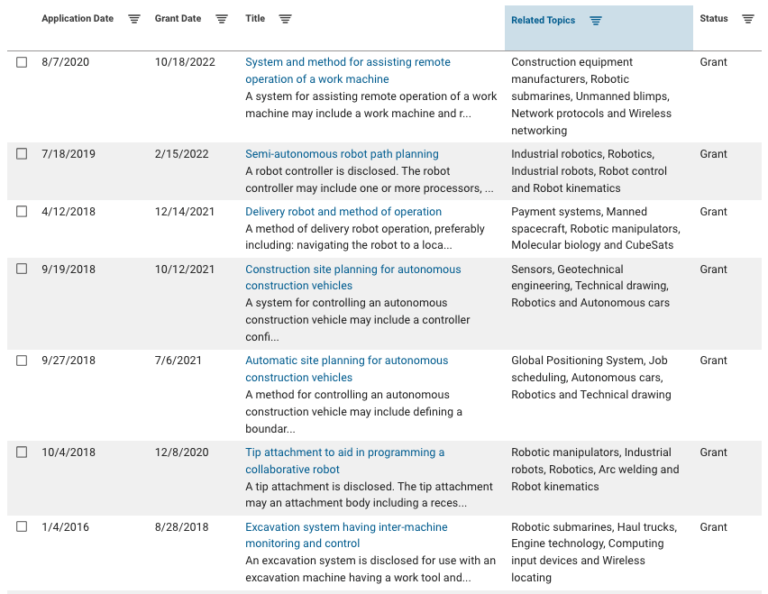
DJI
Founded Year
2006Stage
Series D | AliveTotal Raised
$1.135BValuation
$0000Last Raised
$1B | 7 yrs agoRevenue
$0000Mosaic Score The Mosaic Score is an algorithm that measures the overall financial health and market potential of private companies.
-11 points in the past 30 days
About DJI
DJI specializes in drone and camera technology for both commercial and recreational use within the aerospace and photography sectors. The company offers a range of products, including consumer drones, professional cinematography tools, and handheld camera stabilizers designed to capture smooth photo and video content. DJI also provides enterprise solutions with aerial platforms, payloads, and analytic tools for industries such as agriculture, construction, and public safety. DJI was formerly known as Dajiang Innovation Technology. It was founded in 2006 and is based in Shenzhen, China.
Loading...
ESPs containing DJI
The ESP matrix leverages data and analyst insight to identify and rank leading companies in a given technology landscape.
The consumer electronic providers market includes companies that develop and manufacture consumer electronics such as smartphones, tablets, laptops, televisions, smart home devices, and wearable technology. By exploring this market, customers gain access to cutting-edge devices that enhance convenience, connectivity, and entertainment in their daily lives. Consumer electronic providers offer solut…
DJI named as Challenger among 15 other companies, including Google, Samsung, and Nokia.
Loading...
Research containing DJI
Get data-driven expert analysis from the CB Insights Intelligence Unit.
CB Insights Intelligence Analysts have mentioned DJI in 5 CB Insights research briefs, most recently on Feb 13, 2025.
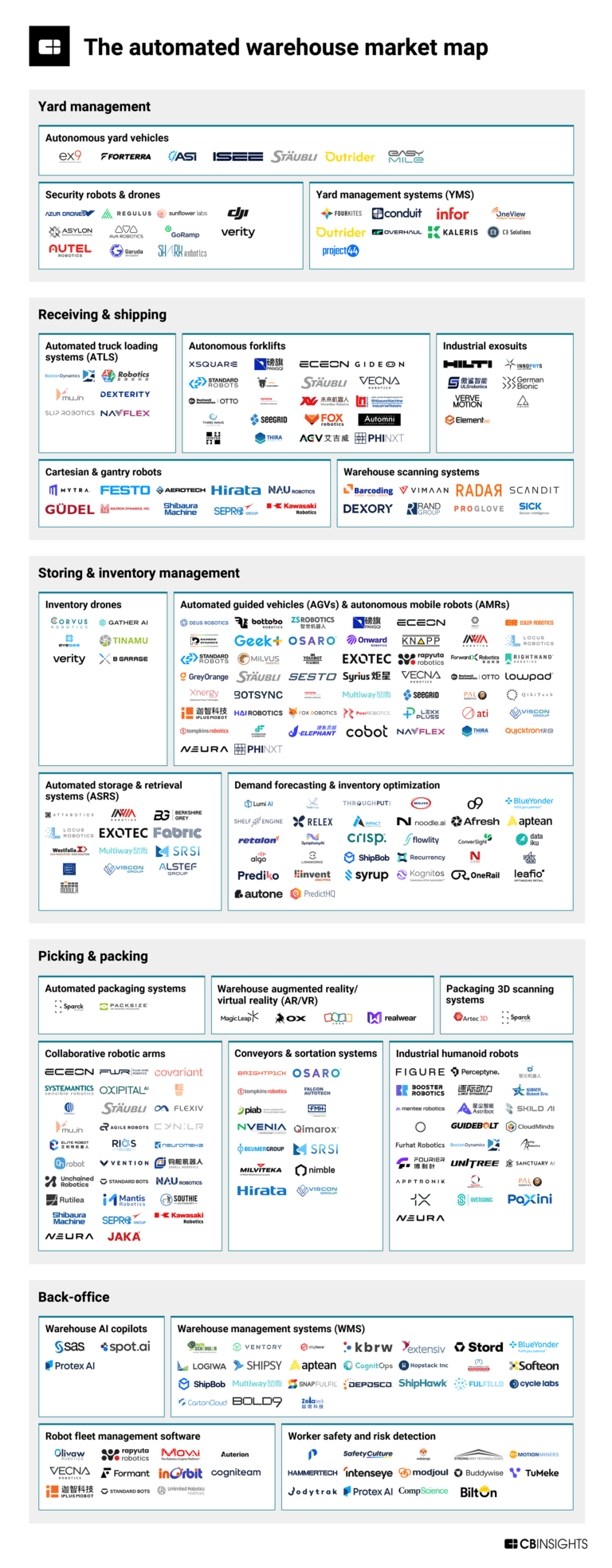
Feb 13, 2025
The automated warehouse market map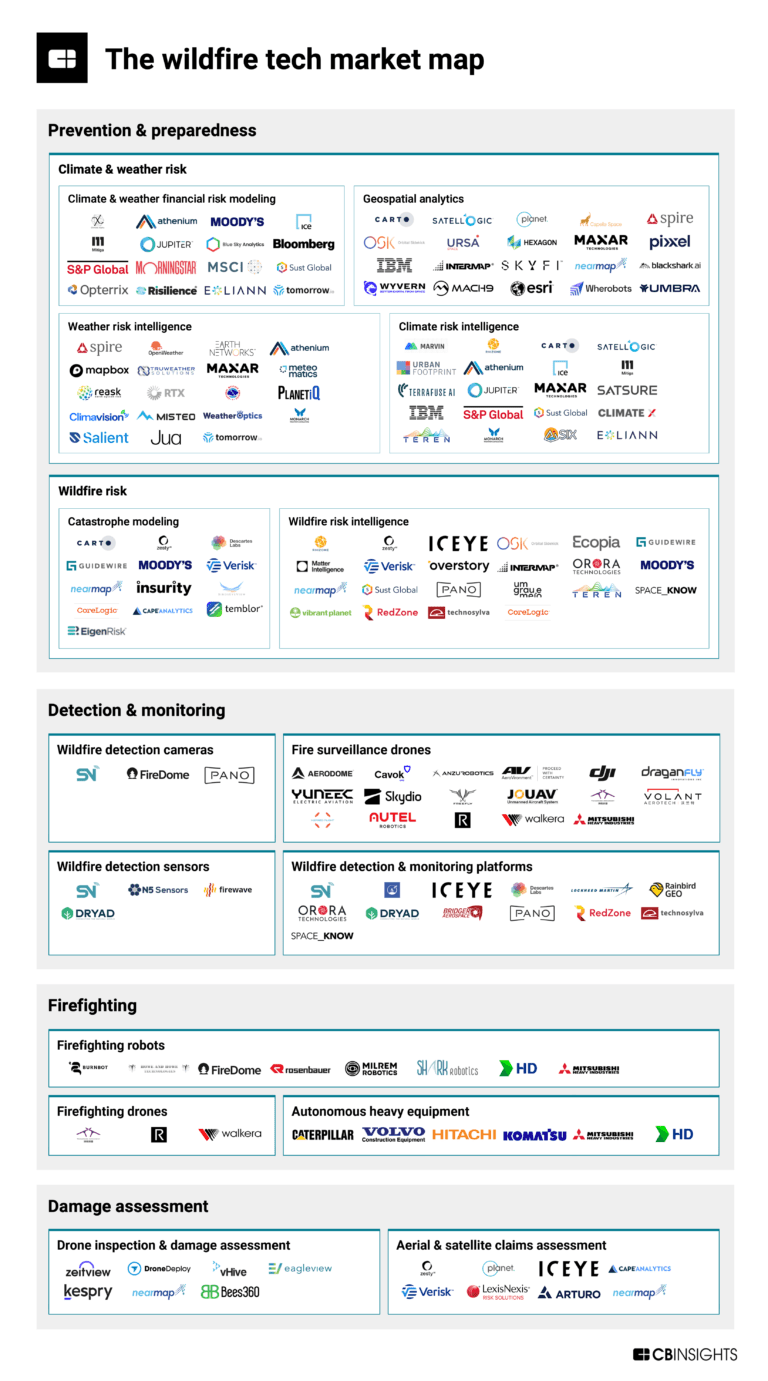
Feb 13, 2025
The wildfire tech market map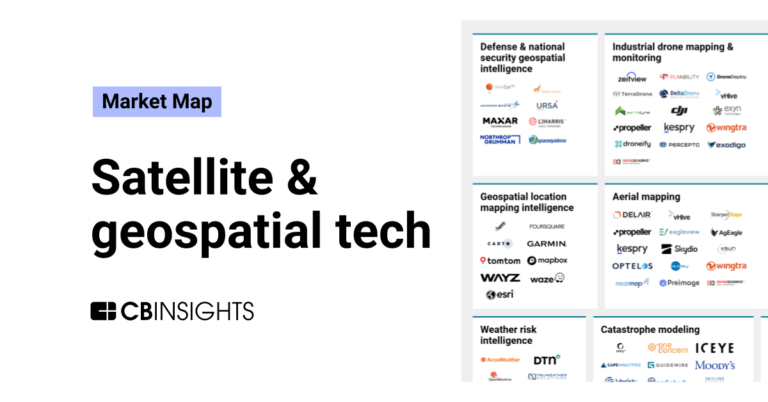
Mar 1, 2024
The satellite & geospatial tech market map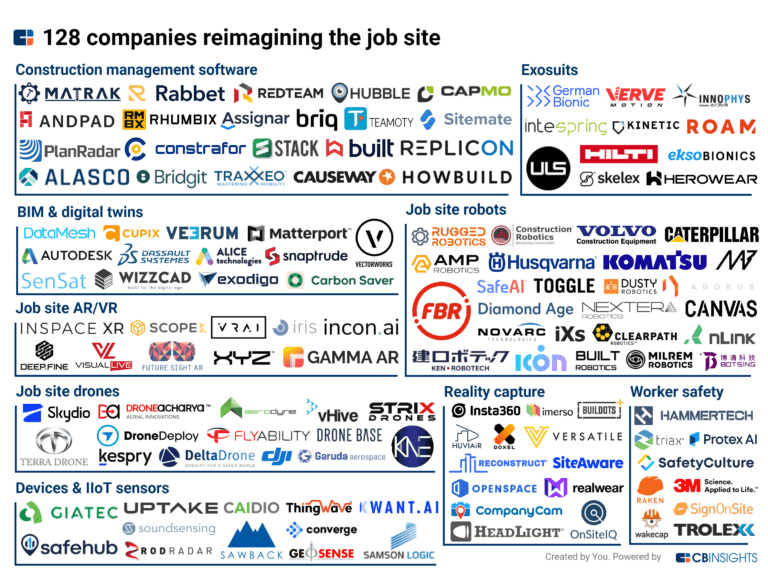
Nov 18, 2022
128 companies building the future of the job siteExpert Collections containing DJI
Expert Collections are analyst-curated lists that highlight the companies you need to know in the most important technology spaces.
DJI is included in 8 Expert Collections, including Construction Tech.
Construction Tech
1,467 items
Companies in the construction tech space, including additive manufacturing, construction management software, reality capture, autonomous heavy equipment, prefabricated buildings, and more
Unicorns- Billion Dollar Startups
1,270 items
Robotics
2,699 items
This collection includes startups developing autonomous ground robots, unmanned aerial vehicles, robotic arms, and underwater drones, among other robotic systems. This collection also includes companies developing operating systems and vision modules for robots.
Conference Exhibitors
6,062 items
Companies that will be exhibiting at CES 2018
Advanced Manufacturing
3,770 items
Companies in the advanced manufacturing tech space, including companies focusing on technologies across R&D, mass production, or sustainability
Job Site Tech
925 items
Companies in the job site tech space, including technologies to improve industries such as construction, mining, process engineering, forestry, and fieldwork
DJI Patents
DJI has filed 2402 patents.
The 3 most popular patent topics include:
- unmanned aerial vehicle manufacturers
- rotating disc computer storage media
- gyroscopes

Application Date | Grant Date | Title | Related Topics | Status |
|---|---|---|---|---|
7/13/2020 | 2/25/2025 | Operating amusement attractions, Avionics, Unmanned aerial vehicle manufacturers, Radar, Electronic engineering | Grant |
Application Date | 7/13/2020 |
|---|---|
Grant Date | 2/25/2025 |
Title | |
Related Topics | Operating amusement attractions, Avionics, Unmanned aerial vehicle manufacturers, Radar, Electronic engineering |
Status | Grant |
Latest DJI News
Apr 9, 2025
China’s government is calling for companies to abide by the country’s 44 hour weekly work limit.PHOTO: QILAI SHEN/NYTIMES UPDATED Apr 09, 2025, 08:44 AM Thanks for sharing! BEIJING - A handful of major Chinese companies like home appliance maker Midea have new badges of honour this year: mandatory clock-off times for staff and bans on after-hours meetings. Staff at Midea once toiled till late in the evening, but now they’re told to leave by 6.20pm. The company’s page on social media app WeChat even shows a photo of people listening to a band with a caption that reads: “What do you do after work? It’s after work when life really starts.” In China, this counts as radical corporate messaging, a sharp contrast to “996” or the practice of working from 9am to 9pm six days a week - famously called a “huge blessing” by Alibaba co-founder Jack Ma and an integral part of its tech sector for much of the past 15 years. Other companies have also made changes, even if not quite as dramatic. At fellow appliance maker Haier, employees have celebrated on social media the introduction of a five-day work week. Workers at DJI, the world’s largest drone manufacturer, have posted about their joy at a new policy declaring offices must be vacated by 9pm. “No more worrying about missing the last metro, no more worrying about waking up the wife when I get home,” wrote one DJI worker who said he often used to work past midnight. Haier and DJI did not respond to requests for comment. In another sign of how the zeitgeist for China Inc is slowly changing, a Beijing law firm was fined in March for not taking corrective measures after it illegally extended staff working hours - a rare imposition of a penalty by authorities that drew widespread praise on social media. But whether these nascent corporate efforts will turn into winds of change remains to be seen. Analysts say the mandatory clock-offs seem to have been prompted by changes to European Union labour laws rather than a welling up of social pressure within China. And while “996” was deemed illegal by China’s top court in 2021, many people in tech and finance still work extraordinary long hours. Recent years have even seen the emergence of a new term “007“, referring to being either at work or on call all day every day. Significantly, however, China’s government is calling for companies to abide by the country’s 44 hour weekly work limit. A State Council action plan to boost consumer spending unveiled in March said workers’ rights to rest and vacation should be guaranteed and paid leave should be encouraged. State media have also run articles making those points. That fits with Chinese policymakers’ desire to see the world’s second-largest economy driven more by consumption and less reliant on exports - a goal that has only taken on more urgency with the imposition of additional hefty US tariffs under President Donald Trump. Ms Shujin Chen, China economist at Jefferies, says that while the government is earnest about promoting change, it won’t be easy given how the country’s sputtering economic growth and lack of jobs have fed financial insecurity. “They want people to like relax more, have more holidays and consume more,” she said. “If you don’t have enough income, and if you hardly keep your job, it’s very hard for people to do that.” More on this Topic A long week China has a long average working week - at 46.1 hours in 2024, according to the International Labour Organisation. That compares with 38.6 hours in South Korea, 38 hours in the United States and 36.6 hours in Japan. Chinese government data puts the number even higher at 49.1 hours in January, up from 46.2 in April 2022, the earliest date for which data is publicly available. The sharp increase can be explained by rising job insecurity, spurring people’s willingness to do more overtime. Before this year, there had been some, albeit rare, pushback within China against excessive working hours. Tech workers launched online protests against “996” in 2019 and 2021. And in 2024, a PR executive at search engine giant Baidu was made to apologise after demanding employees have their phones on 24 hours a day and be always ready to respond. One tech behemoth, social media and gaming firm Tencent, has also cut way back on overtime in at least some of its units, meaning many workers no longer stay back, two employees said. Tencent did not reply to a request for comment. The shift in 2025 to mandatory clock-off times by some companies stems from the EU’s adoption of new rules in December, said Liu Xingliang, a Beijing-based independent industry analyst. The rules ban the sale of products made with forced labour, a definition that encompasses excessive overtime. “These big companies fear losing overseas orders due to violations,” said Liu, noting that while manufacturers of goods were feeling pressure from this law, China’s internet and software firms are less likely to be impacted. Midea formalised its new rules which ban “performative overtime” in January and employee feedback has “definitely been very positive,” Mr Zhao Lei, vice-president of the company’s home air conditioning division, said in a statement. “We want to focus on generating innovation and creating value within the eight-hour work day, rather than after,” he said. Not all employees are completely convinced, however. “I am not sure the changes are sustainable,” said one employee who declined to be identified for fear of repercussions. The employee said he was typically on call 24 hours a day and has previously been pulled into meetings even when on vacation. REUTERS More on this Topic
DJI Frequently Asked Questions (FAQ)
When was DJI founded?
DJI was founded in 2006.
Where is DJI's headquarters?
DJI's headquarters is located at No.55 Xianyuan Road, Shenzhen.
What is DJI's latest funding round?
DJI's latest funding round is Series D.
How much did DJI raise?
DJI raised a total of $1.135B.
Who are the investors of DJI?
Investors of DJI include New Horizon Capital, Kleiner Perkins, Accel, HongShan, Maison Capital and 4 more.
Who are DJI's competitors?
Competitors of DJI include Wingtra, Skydio, Dedrone, Percepto, Flyability and 7 more.
Loading...
Compare DJI to Competitors

Skydio focuses on autonomous drone technology for applications in public safety, defense, and energy sectors. The company offers drones equipped with sensors to capture and process data autonomously, supporting operations such as emergency response, critical infrastructure inspection, and site security. Skydio's drones are used by public safety agencies, military branches, and utility providers. It was founded in 2014 and is based in San Mateo, California.

Exyn Technologies focuses on the development of autonomous aerial robot systems. The company's main offerings include aerial robot software enabling it to operate in GPS-denied environments and perform safe, and 3D mapping in high-risk areas. It serves the mining, government, and construction sectors. It was founded in 2014 and is based in Philadelphia, Pennsylvania.

DroneDeploy specializes in reality capture software. It focuses on drone mapping and photo documentation across various industries. The company provides a platform that enables commercial drones and ground robots to capture and organize photos, generate maps, and produce inspection reports, all integrated with AI for data analysis. DroneDeploy serves sectors such as construction, agriculture, and energy, offering solutions tailored to automate inspections and improve operational efficiency. DroneDeploy was formerly known as Infatics. It was founded in 2013 and is based in San Francisco, California.

xCraft specializes in the design and manufacture of commercial drones within the unmanned aerial systems (UAS) industry. The company offers a range of drones including tethered models for extended flight duration, RTK-equipped drones for surveying and mapping, and VTOL drones for travel. xCraft serves sectors such as defense, public safety, surveying and mapping, and mining and construction. It was founded in 2013 and is based in Coeur D Alene, Idaho.

Propeller is a company specializing in providing drone technology and data solutions for the construction, mining, and waste management sectors. Their main offerings include a cloud-based platform for mapping, measuring, and managing worksites with survey-grade accuracy, as well as tools for earthwork tracking, volume calculations, and subcontractor management. It was founded in 2014 and is based in Surry Hills, New South Wales.
Autel Robotics focuses on the design and production of camera drones within the technology and consumer electronics sectors. The company provides drones equipped with imaging capabilities and features for photography and videography. It serves the consumer and enterprise drone markets with products that meet different user needs. It was founded in 2014 and is based in Shenzhen, China.
Loading...

